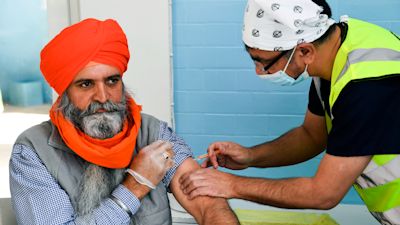Experts will know more about Omicron transmissibility 'within days' as variant reaches 23 countries

How worried should we be about the spread of the Omicron variant? ITV News Health Editor Emily Morgan reports
The Omicron variant has now been reported in at least 23 countries around the globe, the World Health Organization (WHO) has said.
It comes as the group said it expected experts to have more information about the transmissibility of the variant, first identified in South Africa, “within days”.
At least 32 cases of Omicron have been identified in the UK so far - a number expected to increase further.
Earlier this week, Boris Johnson announced that in order to tackle the new Omicron variant, everyone in England eligible for a coronavirus booster jab will be offered one by the end of January.
The government has now secured a deal for another 114 million jabs to "future proof" the UK's Covid vaccination programme.
But in Wednesday's press briefing, the WHO suggested the primary goal of all governments should be ensuring that all vulnerable individuals have at least been offered their first vaccine dose.
"It’s tough for some countries who have huge amounts of excess vaccine to decide who to give it to, but that’s not the problem being faced by a lot of countries around the world who can’t get even primary vaccination to their most vulnerable," Dr Michael Ryan said in response to a question about England's booster programme.
"It’s a luxurious position to be in if you’re in a position to be able to have enough vaccine to do that."
Dr Ryan added he knew of no evidence to suggest offering booster Covid vaccinations to entire populations "is going to provide any greater protection for otherwise healthy individuals against hospitalisation or death.
"The real risk of severe disease, hospitalisation and death lies in particularly at-risk and vulnerable individuals who do require protection against all variants of Covid-19," he added.
WHO urges governments around the world to first vaccinate vulnerable individuals
Amid some concerns that the Omicron variant could evade available vaccines WHO's Dr Maria Van Kerkhove stressed at Wednesday's briefing: "There is no indication that the vaccine won't work".
She added that even with a potential reduction in efficacy, "it is still better to have the vaccine".
Indeed, European Commission President Ursula von der Leyen said on Wednesday that EU nations should consider making vaccinations mandatory because too many people are still refuse to get jabs voluntarily.
The EU-wide vaccination rate stands at 66%, and unexpectedly high case surges in much of the 27-nation bloc has led many member countries to renew mask requirements and take other steps to curb infections.
Ms von der Leyen said it was “understandable and appropriate" to have a discussion about "how we can encourage and potentially think about mandatory vaccination within the European Union."
In the UK, those who have tested positive for the variant are isolating, as are their contacts, while work is under way to establish if there are any links to travel to southern Africa.
The UKHSA said it has now identified cases of Omicron in the East Midlands, East of England, London, the South East and North West - bringing England's total to at least 22.
A further case has also been identified in Scotland, the agency said, bringing the total across the nation to at least 10.
It comes as the latest Covid data shows a further 48,374 lab-confirmed Covid-19 cases in the UK as of 9am on Wednesday. While a further 171 deaths within 28 days of testing positive have been reported.
Listen to the ITV News coronavirus podcast
Peter Openshaw, who is a member of the UK's New and Emerging Respiratory Virus Threats Advisory Group (Nervtag) but was speaking to ITV News in a personal capacity, said: "We are all really bracing ourselves for a bit of a sea change in the way Covid is behaving.
"I would be surprised if we don’t see a lot of infections over the next few months. I would be delighted, but I would be surprised".